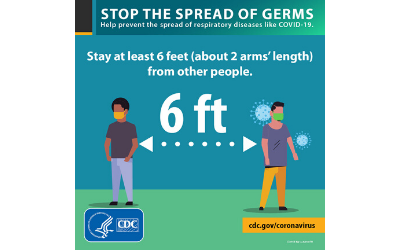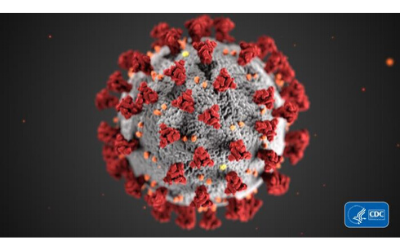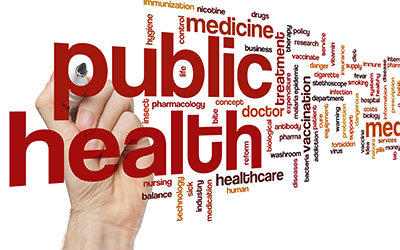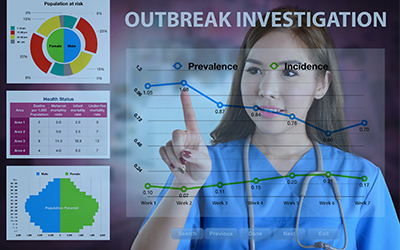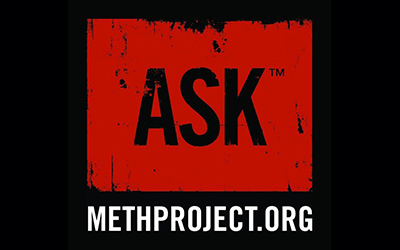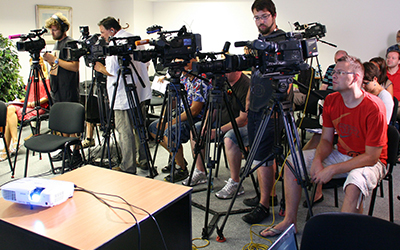
by R-IV PHTC | Aug 21, 2020 | Training
Reopening Schools Safely During the COVID-19 Pandemic
Year: 2020 | Competency/Strategic Skill: Change Management | Priority Topic: Other Infectious Disease | Setting: Online | Format: On-demand | Sponsor: Emory University/Central Office
Overview:
This is 90-minute recording of a webinar held on August 31, 2020.
As the COVID-19 pandemic continues, schools across the country are deciding how to begin the 2020-21 school year, whether for in-person instruction, virtual learning, or a hybrid approach. In this webinar, health and education experts from the Center for American Progress will discuss the current state of school reopenings, considerations for local officials making decisions about reopening, and related health and education research.

by R-IV PHTC | Aug 13, 2020 | Training
National COVID-19 Vaccine Trials
Year: 2020 | Competency/Strategic Skill: Public Health Fundamentals | Priority Topic: Other Infectious Disease | Setting: Online | Format: On-demand | Sponsor: Emory University/Central Office
Overview:
This is a 60-minute recording of a webinar held on August 18, 2020.
With dozens of COVID-19 vaccine trials in development and updates changing daily, in this webinar, Dr. Carlos del Rio will discuss a few of the leading COVID-19 vaccine trials, the progress that has been made and next steps in the COVID-19 vaccine trial process. We will also explore the safety and efficacy of the COVID-19 vaccine trial process.

by R-IV PHTC | Aug 10, 2020 | Training
Value Based Care 101: Understanding and Preparing for Alternative Payment Models
Year: 2020 | Competency/Strategic Skill: Program Planning | Priority Topic: N/A | Setting: Online | Format: On-Demand | Sponsor: University of North Carolina, Wilmington
Overview:
This is a 90-minute recording of a live webinar. It is the first in a series of two webinars on Value Based Care.
Understand what value-based care is and why there is a value-based care movement. Explore the nationally accepted principles of value-based care. Learn about the philosophy and framework of the HCP-LAN Alternative Payment Model and review the current state of VBC initiatives.
Presented by Michaelle Gady, JD, President and CEO of Atromitos, LLC, Peter Freeman, Senior Consultant at Atromitos, and Sarah Jagger, Vice President of Operations at Atromitos.

by R-IV PHTC | Aug 10, 2020 | Training
Value Based Care 201: Preparedness for the Implementation of VBC Models
Year: 2020 | Competency/Strategic Skill: Program Planning | Priority Topic: N/A | Setting: Online | Format: On-Demand | Sponsor: University of North Carolina, Wilmington
Overview:
This is a 90-minute recording of a live webinar. It is the second in a series of two webinars about Value Based Care.
Value Based Care 201 will be presented by Michaelle Gady, JD, President & CEO of Atromitos, LLC, Peter Freeman, Senior Consultant at Atromitos, and Sarah Jagger, Vice President of Operations at Atromitos. A one hour presentation will be followed by 30-minutes of Q&A.

by R-IV PHTC | Jul 26, 2020 | Training
PPE: What Always Works, What Sometimes Works, What Never Works and Why
Year: 2020 | Competency/Strategic Skill: Public Health Fundamentals | Priority Topic: Other Infectious Disease | Setting: Online | Format: On-demand | Sponsor: Emory University/Central Office
Overview:
This is a one-hour recording of a webinar held on July 30, 2020.
This webinar is co-sponsored by the Alabama Fire College Workplace Safety Training Program and the Deep South Biosafety Worker Training Program.
This webinar will discuss Personal Protective Equipment (PPE) applicable to the COVID 19 crisis. It is assumed that students are aware of standard PPE certification/requirements ( e.g. the US Department of Labor: OSHA standards for both personal and respiratory protection ). This webinar will focus on how to adapt these to the current situation, as well as crisis standards applicable when PPE may be limited/unavailable.

by R-IV PHTC | Jul 13, 2020 | Training
Operational Challenges for EMS during COVID-19
Year: 2020 | Competency/Strategic Skill: Problem Solving | Priority Topic: Other Infectious Disease | Setting: Online | Format: On-Demand | Sponsor: Emory University/Central Office
Overview:
This is a 60-minute recording of a webinar held on July 21, 2020. This webinar is co-sponsored by the Alabama Fire College Workplace Safety Training Program and the Deep South Biosafety Worker Training Program.
The COVID-19 pandemic has created numerous challenges for EMS including out-of-hospital management of patients and PPE use by EMS personnel. Dr. Lekshmi Kumar will discuss the operational changes that have been adapted by Grady EMS during the COVID-19 pandemic including changes to personnel and PPE for patient and personal safety, airway management, resuscitation, and cessation when responding to a cardiac arrest patient. Dr. Isakov will discuss best practices in protecting EMS healthcare personnel and strategies for overcoming PPE resource challenges and complacency in the use of PPE by EMS personnel.

by R-IV PHTC | Jul 8, 2020 | Training
Year: 2020 | Competency/Strategic Skill: Program Planning | Priority Topic: Other Infectious Disease | Setting: Online | Format: On-Demand | Sponsor: Emory University/Central Office
Overview:
This is a one-hour recording of a live webinar held on July 28, 2020.
This webinar is co-sponsored by the Alabama Fire College Workplace Safety Training Program and the Deep South Biosafety Worker Training Program.
The webinar will discuss COVID-19 in pediatric patients specifically focusing on their pre-hospital management with a target audience of first responders. We will review the epidemiology of COVID-19 in pediatrics, assessment and management of pediatric patients with suspected or confirmed COVID-19, prehospital management of pediatric respiratory emergencies and patients with COVID-19, discuss the emerging illness known at MIS-C, and review prehospital cases of pediatric patients with COVID-19.

by R-IV PHTC | Jul 1, 2020 | Training
Alabama Public Health Training Network COVID-19 Series
Year: 2020 | Competency/Strategic Skill: Program Planning | Priority Topic: Other Infectious Disease | Setting: Online | Format: On-Demand | Sponsor: Alabama Public Health Training Network

by R-IV PHTC | Jun 29, 2020 | Training
Chemical Hazards During COVID-19: Disinfectants, Cleaning Chemicals & Tear Gas
Year: 2020 | Competency/Strategic Skill: Public Health Fundamentals | Priority Topic: Other Infectious Disease | Setting: Online | Format: On-demand | Sponsor: Emory University/Central Office
Overview:
This is a 90-minute recording of a webinar held on July 9, 2020. This webinar is co-sponsored by the Alabama Fire College Workplace Safety Training Program and the Deep South Biosafety Worker Training Program.
The COVID-19 Pandemic has created numerous challenges to EMS and Healthcare Providers including responding and managing injuries from exposures to cleaning chemicals and disinfectants by patients who are concerned with virus transmission. Additionally, recent protests have raised concerns regarding risks of viral transmission during crowd gatherings, however, injuries from trauma and tear gas have also been reported. During this webinar, two experts in medical toxicology, will discuss hazards from disinfectants, cleaning chemicals and tear gas as well as the emergency assessment and management of associated injuries.

by R-IV PHTC | Jun 23, 2020 | Training
Crisis on Top of Crisis: Guidance for Disaster Shelters during the COVID-19 Pandemic and How to Deliver the Message
Year: 2020 | Competency/Strategic Skill: Problem Solving | Priority Topic: Other Infectious Disease | Setting: Online | Format: On-demand | Sponsor: Emory University/Central Office
Overview:
This is a 90-minute recording of a webinar held on July 2, 2020. This webinar is co-sponsored by the Georgia Hurricane Response Hub.
Preparing for hurricane season can be stressful especially during the COVID-19 pandemic. During this webinar, CDC experts will discuss special considerations for general population hurricane shelters during the COVID-19 pandemic and how community leaders, nonprofit organizations, and public health professionals can effectively communicate messages. They will also share hurricane resources and educational materials you can use and distribute within your own communities.

by R-IV PHTC | Jun 2, 2020 | Training
Communication Challenges Surrounding the COVID-19 Pandemic
Year: 2020 | Competency/Strategic Skill: Communication | Priority Topic: Other Infectious Disease | Setting: Online | Format: On-Demand | Sponsor: Emory University/Central Office
Overview:
This is 90-minute recording of a webinar held on June 11, 2020.
The COVID-19 pandemic has provided and continues to provide huge challenges to our public health system. One challenge has been behavioral, in that mitigating the consequences of the disease involves huge behavioral changes and long term cooperation on the part of the public at large. Changing behavior and gaining the public’s cooperation is in part a problem in communication and persuasion. In this webinar, we will discuss four challenges to communicating successfully during the COVID-19 pandemic including: (1) the need for clear, consistent, credible and apolitical communication (CCCaP); (2) how various types of informational uncertainty challenge CCCaP; (3) how misinformation challenges CCCaP and how it can be addressed (and not addressed); and (4) looking ahead to the virus’ demise with the development of a successful vaccine, public health campaigns must ready the public to accept vaccination especially in communities which have traditionally had low vaccination rates.
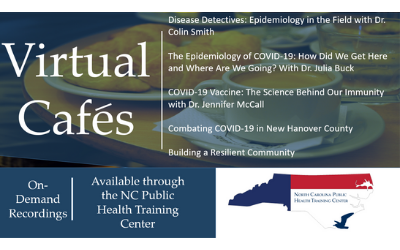
by R-IV PHTC | May 30, 2020 | Training
Year: 2020 | Competency/Strategic Skill: Program Planning | Priority Topic: Other Infectious Disease | Setting: Online | Format: On-Demand | Sponsor: University of North Carolina at Wilmington
Overview:
This is a series of 45- to 60-minute on-demand recordings including:
Building a Resilient Community: J’vanete Skiba of the Resiliency Task Force of New Hanover County discusses resiliency. What is it and why is it important? Learn more about the task force and its efforts to reduce stress and work together during this time of crisis.
Disease Detectives: Dr. Colin Smith, social epidemiologist, demographer and past-president of the Georgia Public Health Association, describes just what social epidemiology is. How do social-structural factors impact patterns of disease and health? Learn how concepts such as social inequality, social relationships and basic epidemiology help us understand distribution of disease. Understand the potential outcomes for COVID-19 social distancing measures and testing policies.
The Epidemiology of COVID-19: Dr. Julia Buck explains the math – yes math – behind the COVID-19 pandemic. Using basic epidemiological models, estimate what proportion of humanity will need to be immune to COVID-19 before the outbreak ends. Hear public health strategies to get us there as safely as possible. Dr. Buck’s interests include disease ecology, parasitology, and mathematical modeling, and she teaches a course on the Ecology of Infectious Diseases in the Biology Department.
COVID-19 Vaccine: Jennifer McCall, PhD, MBA, assistant professor of clinical research, talks about vaccine development, what it would take to develop a COVID19 vaccination, how our immunity works, and more! Dr. McCall’s interests include drug discovery, immunology, and the business of biotechnology.
Combating COVID-19 in New Hanover County: Carla Turner, New Hanover County’s Personal Health Services Manager, outlines the county’s public health efforts to respond to COVID-19.

by R-IV PHTC | May 27, 2020 | Training
Recognizing and Responding to Suspected Human Trafficking
Year: 2020 | Competency/Strategic Skill: Program Planning | Priority Topic: N/A | Setting: Online | Format: On-Demand | Sponsor: Emory University/Central Office
Overview:
This is a 90-minute recording of a webinar. This webinar is co-sponsored by the Injury Prevention Center at Emory.
In this presentation we’ll discuss the nature and dynamics of sex and labor trafficking, and the health impact on adults and children. We’ll review possible indicators of trafficking that may be present under varied conditions, and discuss screening tools that may be helpful in identifying persons at risk of exploitation. We’ll talk about the trauma-informed, rights-based approach to interacting with trafficked persons, and review resources available to those in need. Finally, we’ll discuss how the COVID pandemic is expected to impact the dynamics of human trafficking, and exacerbate existing risk factors for exploitation.

by R-IV PHTC | May 18, 2020 | Featured Training, Training
Community Assessment: Conducting Focus Groups
Year: 2020 | Competency/Strategic Skill: Data Analytics and Assessment | Priority Topic: N/A | Setting: Online | Format: On-Demand | Sponsor: Emory University/Central Office
Overview:
This is a self-paced online course expected to take 60 minutes to complete.
Community assessments use qualitative methods to learn about beliefs, values, and perspectives of needs and assets of a community. Qualitative methods include interviews, focus groups, and forums. The purpose of this course is to introduce focus groups as a method to gain valuable community-level data and provide a practical strategy to plan for, conduct, and analyze the results of a focus group. It is an introductory-level course designed to build competence in data analytics and assessment as well as community engagement in public health professionals, especially those in the governmental public health workforce. There are no prerequisites.
This course contains four modules: an interactive video, reflection questions, resources and an evaluation. The entire training is expected to take 40 minutes to complete. After finishing all modules, learners will earn a certificate of completion. When the certificate is available, learners will see a Certificate button on their dashboard.
Participants will need a broadband internet connection (Google Chrome or Mozilla Firefox are preferred browsers) and computer speakers. For technical support, please contact emoryphtc@emory.edu.
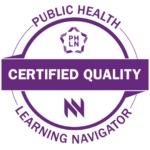

by R-IV PHTC | May 18, 2020 | Training
Concepts of Epidemiology Workshop Series
Year: 2020 | Competency/Strategic Skill: Data Analytics and Assessment | Priority Topic: N/A | Setting: Online | Format: On-demand | Sponsor: Mississippi Public Health Institute
Overview:
This is a series of on-demand workshops.
There are three workshops in the series: basic, intermediate and advanced concepts of epidemiology. All workshops are presented by Danielle Fastring. Dr. Fastring is an Assistant Teaching Professor at the University of Southern Mississippi in the School of Nursing and Health Professions where she teaches graduate courses in Epidemiology, Biostatistics, Environmental Health, and SAS programming. She received her PhD in Epidemiology from Tulane University School of Public Health and Tropical Medicine. She was a Fellow in the Maternal Child Health Epidemiology Doctoral Training Program sponsored by the Health Resources and Services Administration (HRSA).

by R-IV PHTC | May 14, 2020 | Training
Increased Suicide Rates for U.S. Teens and Young Adults
Year: 2020 | Competency/Strategic Skill: Program Planning | Priority Topic: Mental Health | Setting: Online | Format: Live | Sponsor: Emory University/Central Office
Overview:
This is a 90-minute recording of a live webinar.
This webinar is being co-sponsored with the Injury Prevention Research Center at Emory.
Description: Youth suicide in the United States is on the rise and suicide is a leading cause of death for this population. Youth suicide is a public health challenge and requires a comprehensive approach to address its multiple risk and protective factors. Strategies with the best available evidence to prevent suicide range from strengthening economic supports of families, to reducing access to lethal means among people at risk, to promoting connectedness, teaching coping and problem-solving skills, and identifying and supporting people at risk.

by R-IV PHTC | May 14, 2020 | Training
Understanding Models to Predict Viral Spread and Community Impact
Year: 2020 | Competency/Strategic Skill: Problem Solving, Leadership and Systems Thinking | Priority Topic: Other Infectious Diseases | Setting: Online | Format: On-Demand | Sponsor: Emory University/Central Office
Overview:
This is a recording of a 90-minute webinar.
In this presentation we will discuss how models predict viral spread including the spread of COVID-19 as well as the impact it has on the community. We will review three modeling strategies used to model viral spread and how assumptions in models impact decisions made from various model outputs. We will also explore how models are used in public health policy to control infectious disease spread.

by R-IV PHTC | May 5, 2020 | Featured Training, Training
Thriving in an Online Work Environment
Year: 2020 | Competency/Strategic Skill: Leadership and Systems Thinking, Change Management | Priority Topic: N/A | Setting: Online | Format: On-demand | Sponsor: Emory University/Central Office
Overview:
Are you now working remotely? Are you finding it difficult to manage your stress and productivity? Are you frustrated by inefficient virtual meetings? Are you responsible for transitioning in-person trainings to the online environment? If you are grappling with these issues and others, you are not alone.
The Midwestern Public Health Training Center, the Rocky Mountain Public Health Training Center, and the Region IV Public Health Training Center have collaborated to create this course, Thriving in an Online Work Environment. Full of useful tips, practices, and resources for staying productive and connected in an online environment, this course can be viewed in its entirety or by individual topics.

by R-IV PHTC | Apr 9, 2020 | Training
Building Psychological Resilience for the Public Health Workforce during the COVID19 Pandemic
Year: 2020 | Competency/Strategic Skill: Problem Solving | Priority Topic: Mental Health | Setting: Online | Format: On-demand | Sponsor: Emory University/Central Office
Overview:
This is a 70-minute recording of a live webinar. The Southeast Mental Health Technology Transfer Center co-sponsored this webinar.
The COVID-19 pandemic has led to a second pandemic of stress, anxiety and fear. As public health workers, your work has a unique level of stress during this time. We are best able to maintain our mental health through these difficult times if we stay aware of the effects of stress, take steps to stay mentally healthy, and maintain connections with others. This webinar will offer information on awareness, self-care and connection with others so public health workers can develop a plan for maintaining their mental health. We will discuss common issues such as coping with fear, anxiety and loss; changing work demands; navigating family relationships; and coping with an uncertain future as the pandemic continues.

by R-IV PHTC | Mar 23, 2020 | Training
Addressing Your Questions About COVID-19
Year: 2020 | Competency/Strategic Skill: Public Health Fundamentals | Priority Topic: Other Infectious Disease | Setting: Online | Format: On-Demand | Sponsor: Emory University/Central Office
Overview:
This is a 90-minute recording of a webinar held on Thursday, March 26, 2020.
With our state and local public health workers being at the forefront of this pandemic, you are in a position to provide your community with life-saving information. Yet, with the COVID-19 landscape changing so rapidly, it is hard to have the latest, accurate information to educate those in your community. With this webinar you will have the opportunity to ask questions and receive feedback from our speaker, Carlos del Rio, MD. This webinar will have a brief update on the pandemic with the majority of the time spent on Q & A.

by R-IV PHTC | Mar 5, 2020 | Featured Training, Training
Community Assessment: Conducting Windshield and Walking Surveys
Year: 2020 | Competency/Strategic Skill: Data Analytics and Assessment; Community and Partner Engagement | Priority Topic: N/A | Setting: Online | Format: On-Demand | Sponsor: Emory University/Central Office
Overview:
This is a self-paced online course expected to take 40 minutes to complete.
This course introduces the components of windshield and walking surveys, explains the data collection and analysis process, and discusses how observational data can be used to inform subsequent phases of the community assessment. It is an introductory-level course designed to build competence in data analytics and assessment as well as community engagement in public health professionals, especially those in the governmental public health workforce. There are no prerequisites.
This course contains four modules: an interactive video, reflection questions, resources and an evaluation. The entire training is expected to take 40 minutes to complete. After finishing all modules, learners will earn a certificate of completion. When the certificate is available, learners will see a Certificate button on their dashboard.
Participants will need a broadband internet connection (Google Chrome or Mozilla Firefox are preferred browsers) and computer speakers. For technical support, please contact emoryphtc@emory.edu.


by R-IV PHTC | Mar 5, 2020 | Training
Pediatric Obesity: Clinical and Community Approaches to Treatment and Prevention
Year: 2020 | Competency/Strategic Skill: Program Planning | Priority Topic: Childhood Obesity | Setting: Online | Format: On-Demand | Sponsor: Emory University/Central Office
Overview:
This is a 90-minute recording of a live webinar.
Pediatric obesity has continued to challenge our clinics and communities for effective and supportive approaches to improve health and treatment of disease. We will refine the clinical assessment of the severity of the disease of obesity and its complications as well as discuss treatments appropriate for the different classes of obesity. Then we will explore community efforts to promote health, prevent obesity, and support those working to lose weight.

by R-IV PHTC | Mar 5, 2020 | Training
Coronavirus Disease (COVID-19): Protecting the Public from the Current Outbreak
Year: 2020 | Competency/Strategic Skill: Program Planning | Priority Topic: Other Infectious Disease | Setting: Online | Format: On-Demand | Sponsor: Emory University/Central Office
Overview:
This is a recording of a 90-minute webinar held on March 2, 2020.
The reach of the novel Coronavirus Disease (COVID-19) outbreak continues to expand beyond where it was first detected in China. As of January 30, 2020, the WHO declared the outbreak a public health emergency of international concern and as of February 24, 2020 there were 14 positive cases reported in the U.S. This webinar will share information on what the COVID-19 is, how it is transmitted and the current distribution of cases. Participants will learn how to identify the symptoms of a COVID-19 infection and how to report a person under investigation. The webinar will conclude with key prevention and protection strategies as well as communication messages for the public.

by R-IV PHTC | Feb 21, 2020 | Featured Training, Training
An Introduction to Community Assessment and Data Collection
Year: 2020 | Competency/Strategic Skill: Data Analytics and Assessment | Priority Topic: N/A | Setting: Online | Format: On-Demand | Sponsor: Emory University/Central Office
Overview:
This is a self-paced online course expected to take 45 minutes to complete.
This course provides an introduction to community assessment, data collection and sharing data findings. It is an introductory-level course designed to build competence in data analytics and assessment as well as community engagement in public health professionals, especially those in the governmental public health workforce. The course contains four modules: the content module, reflection questions, tools and resources, and an evaluation.

by R-IV PHTC | Feb 13, 2020 | Training
Working Together for the Future: Tapping into Federal Programs and Services in Your Community
Year: 2017 | Competency/Strategic Skill: Resource Management and Financial Planning | Priority Topic: N/A | Setting: Online | Format: On-Demand | Sponsor: Emory University/Central Office
Overview:
This is a recording of a live, 90-minute webinar.
This recorded webinar highlights federal programs and services, with emphasis on how health departments can leverage available resources that may improve health outcomes within communities they serve. Health departments, committed to maintaining and improving the health of the communities they serve, may be unaware of the vast array of federal programs and services that they can tap into to help them achieve their mission. For instance, within the U.S. Department of Health and Human Services (HHS), the Health Resources and Administration (HRSA) and the Office of Minority Health (OMH) share goals to achieve health equity and provision of essential health services to people who are geographically isolated, economically or medically vulnerable, including people living with HIV/AIDS, pregnant women, mothers, and their families and those in need of high quality primary health care.

by R-IV PHTC | Feb 11, 2020 | Featured Training, Training
Embracing Public Health 3.0 and Creating Cross-Sector Partnerships
Year: 2020 | Competency/Strategic Skill: Community and Partner Engagement | Priority Topic: N/A | Setting: Online | Format: On-Demand | Sponsor: Emory University/Central Office
Overview:
This is a 90-minute recording of a live webinar.
The Future of Public Health report, published in 1988, by the Institute of Medicine, highlighted emerging issues and questioned health departments’ infrastructures and capacity to respond. The report revealed a public health system in disarray. Over the years, public health has evolved, and many health concerns have been addressed.
Today Public Health 3.0 is positively informing public health practice. South Carolina Department of Health and Environmental Control (SC DHEC) Upstate Public Health Region and Tennessee Department of Health have both embraced the Public Health 3.0 practice era. This presentation will discuss lessons learned by each of these states and how minor adjustments can lead to stronger cross-sectoral community partnerships.

by R-IV PHTC | Feb 11, 2020 | Training
Year: 2020 | Competency/Strategic Skill: Program Planning | Priority Topic: Opioid Abuse | Setting: Online | Format: On-Demand | Sponsor: Emory University/Central Office
Overview:
This is a 90-minute recording of a live webinar.
This webinar will explore the role of stigma and how it interacts with the disease of addiction. Addiction is a chronic medical condition characterized by relapses and remissions that is often misunderstood, unrecognized and seldom appropriately treated. We shall examine stigma from three perspectives. First at the level of the individual, where the shame and guilt of addiction keeps the person suffering from a substance use disorder from self-identifying as in need of treatment and appropriately accessing resources. Second, at the level of the family and friends, stigma can prevent advocating for their loved ones as well as keeps the patient in the shadows. And finally at the level of the society stigma may lead to failure in effective treatment policy, denial of services, discrimination and marginalization of our patients.

by R-IV PHTC | Feb 11, 2020 | Featured Training, Training
Year: 2020 | Competency/Strategic Skill: Change Management | Priority Topic: N/A | Setting: Online | Format: On-demand | Sponsor: Emory University/Central Office
Overview:
This is a 90-minute recording of a live webinar.
Change can be scary. It involves terrible things like the unknown, discomfort, work, and losing control. It can also be an opportunity for discovery, growth, creativity, and letting go. In fact, these things are often two sides of the same coin. So how can we make the most out of a world where so much is constantly in flux? How can we move forward and be productive when we never seem to have enough information or time to make the right decision?
Instructor Shana Merlin will be pulling tools from the world of improvisational theater, where change is happening constantly in front of a live audience. We will take a look at what our internal response is to change and see if we can shift it into something more productive. Like a good improviser, participants will learn how to recover quickly from unexpected events, be curious about the unfamiliar, be flexible in response to new information and start things without knowing exactly how they will end.
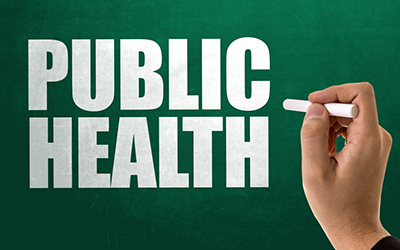
by R-IV PHTC | Jan 13, 2020 | Training
Structures and Functions of Public Health
Year: 2015 | Competency/Strategic Skill: Public Health Fundamentals | Priority Topic: N/A | Setting: Online | Format: On-Demand | Sponsor: University of Louisville
Overview:
This course is one hour long.
This course is designed to be an introduction to public health definitions and structures for those who are new to the field. The course describes the organizational structures, functions, and authorities of local, state, and federal public health agencies.

by R-IV PHTC | Jan 13, 2020 | Training
Public Health Evidence into Action
Year: 2015 | Competency/Strategic Skill: Program Planning | Priority Topic: N/A | Setting: Online | Format: On-Demand | Sponsor: Emory University/Central Office
Overview:
This is a series of three 60-minute recordings of live webinars.
The series aims to equip public health practitioners, community leaders, and health educators to implement evidence-based approaches (EBAs) relevant to community practice. Case examples include real-world EBAs from work with our partners in nutrition, physical activity, tobacco control, and cancer screening. The content, timeframe, and case examples can be adapted to specific audience needs and interests.
Part 1: How to Find Health Initiatives that Work
Part 2: Balancing the Evidence with Your Community Needs
Part 3: Implementing and Evaluating with Quality and Fidelity
The following series of three 60 minute webinar sessions (Jan-Feb 2015) aim to equip public health practitioners, community leaders, and health educators to implement evidence-based approaches (EBAs) relevant to community practice. Sessions will be spaced 2-3 weeks apart. Case examples include real-world EBAs from work with our partners in nutrition, physical activity, tobacco control, and cancer screening. The content, timeframe, and case examples can be adapted to specific audience needs and interests.
Strategic criteria for selecting EBAs that fit a community will be presented, including audience characteristics, fit with mission, leadership support, and organizational readiness. We will also define implementation fidelity, steps in program adaptation, and what likely can be changed in an EBA while maintaining fidelity.

by R-IV PHTC | Jan 13, 2020 | Training
Public Health Leadership Institute
Year: 2020 | Competency/Strategic Skill: Leadership and Systems Thinking | Priority Topic: N/A | Setting: In-Person | Format: Live | Sponsor: Emory University/Central Office
Overview:
This is an 8-month online and in-person program. Participants must apply to participate.
The Region IV Public Health Training Center has partnered with the J.W. Fanning Institute for Leadership Development at the University of Georgia to offer the Region IV Public Health Leadership Institute (PHLI). The PHLI provides training for individuals from across the eight states that comprise HHS Region IV (Alabama, Florida, Georgia, Kentucky, Mississippi, North Carolina, South Carolina, Tennessee). There is no fee to participate.
The PHLI is an 8-month experience providing 40 contact hours of interaction. The Institute consists of a virtual orientation, one in-person 3-day retreat, and 6 virtual sessions, lasting 1½ hours each. In addition to these sessions, participants will be asked to complete approximately 2 hours of intersession work between the virtual sessions.
By the end of the Institute, participants will be able to:
- Identify personal leadership strengths
- Address a leadership challenge through a self-directed adaptive approach
- Engage in peer consulting with Region IV colleagues
- Apply leadership competencies in the context of public health

by R-IV PHTC | Jan 13, 2020 | Training
Practical Public Health Ethics: Making Good Decisions about Challenging Issues
Year: 2018 | Competency/Strategic Skill: Problem Solving | Priority Topic: N/A | Setting: Online | Format: On-Demand | Sponsor: Emory University/Central Office
Overview:
This is a 90-minute recording of a live webinar.
Health officials regularly face tough decisions involving ethics such as allocating scare resources or ensuring that risks and benefits are equitably distributed. This webinar introduces participants to public health ethics, describes practical skills for ethical decision making, and provides links to resources for meeting the new Public Health Accreditation Board standards for addressing ethical issues. We also call attention to the human-centered design approach and highlight Brokered Dialogue, an innovative method for dealing with controversial topics such as establishing Syringe Service Programs to address the opioid crisis. We will conclude by discussing an ethics case study centered on childhood obesity.

by R-IV PHTC | Jan 13, 2020 | Training
Giving and Receiving Feedback For Personal and Professional Growth
Year: 2017 | Competency/Strategic Skill: Resource Management and Financial Planning | Priority Topic: N/A | Setting: Online | Format: On-Demand | Sponsor: Emory University/Central Office
Overview:
This is a 90-minute recording of a live webinar.
Without feedback, individuals and organizations cannot grow. Feedback is the key to better serving your community and getting the most out of your team. But giving and receiving feedback can be incredibly uncomfortable and unproductive. And when done poorly, feedback can actually be destructive. In this interactive and light-hearted session, learn the right questions to ask and how to handle the feedback – good or bad – with courtesy and professionalism. Get tools in how to deliver feedback that is specific, actionable and measurable. So instead of shrinking from feedback you can embrace it for the opportunity it is.

by R-IV PHTC | Jan 13, 2020 | Training
Public Health in a Time of Change: Charting the Course for Health Policy, Population Health, and Evidence-Based Prevention
Year: 2017 | Competency/Strategic Skill: Policy Development | Priority Topic: N/A | Setting: Online | Format: On-Demand | Sponsor: Emory University/Central Office
Overview:
This is a 90-minute recording of a live webinar.
This webinar will focus on the efforts to strengthen and adapt public health to address the current health needs of the population at a moment of change and uncertainty. Auerbach will share his experiences and observations as a leader at the local, state and federal levels including the CDC. And he will describe the work of the agency he now oversees – the Trust for America’s Health – as it charts a course in the current health policy debates in Washington and around the nation.

by R-IV PHTC | Jan 13, 2020 | Training
Cross-Sector Collaboration – Easy to Say, Challenging to Do: An Introduction to PHRASES
Year: 2019 | Competency/Strategic Skill: Community and Partner Engagement | Priority Topic: N/A | Setting: Online | Format: On-Demand | Sponsor: Emory University/Central Office
Overview:
This is a 90-minute recording of a live webinar.
Forward-thinking public health professionals are reaching across sectors to build healthier communities. Many leaders in other sectors do not understand the value of collaborating with public health. PHRASES (Public Health Reaching Across Sectors) is designing the PHRASES Toolkit to provide evidence-based framing tools and resources to help public health professionals communicate and collaborate more effectively with other sectors. During this webinar, Maureen Byrnes of PHRASES and Melissa Monbouquette of the de Beaumont Foundation will share information about this upcoming toolkit and how public health practitioners will be better equipped to successfully advance partnerships with hospitals, housing, education, and the business sectors.

by R-IV PHTC | Jan 13, 2020 | Training
Public Health Emergency Preparedness and Response Capabilities: National Standards for State, Local, Tribal, and Territorial Public Health
Year: 2019 | Competency/Strategic Skill: Program Planning | Priority Topic: N/A | Setting: Online | Format: On-Demand | Sponsor: Emory University/Central Office
Overview:
This is a 90-minute recording of a live webinar.
The purpose of this webinar session is to provide public health professionals and their partners with an initial working knowledge of the Center for Disease Control and Prevention (CDC) capability update initiative for emergency preparedness and response and how it applies in practice. This webinar may be of particular interest to those working in preparedness and response from multiple sectors and roles including state and local governmental public health, academia, health care, communications, responders, and community agencies. The capabilities are national standards that are cross-cutting among public health priority topics to support the full preparedness cycle. The capabilities provide a planning framework, help define roles, offer tools for stakeholder collaboration, suggest consistent terminology, and consider evaluation planning.

by R-IV PHTC | Jan 13, 2020 | Training
Change, Challenge, Adversity, and Resilience: Ideas and Tools for a Turbulent World
Year: 2018 | Competency/Strategic Skill: Change Management | Priority Topic: N/A | Setting: Online | Format: On-Demand | Sponsor: Emory University/Central Office
Overview:
This is a 90-minute recording of a live webinar.
The world of public health is full of changing priorities and goals. It’s easy to feel overwhelmed by the many shifting demands and challenges you encounter every day. This webinar will introduce you to some ideas and tools that can support your effectiveness and well-being. We’ll discuss the relationship between change, challenge, and personal energy. You’ll learn about four key roles in the change process and the most important skills needed for each of them. And we’ll review the building blocks of resilience that you can use to help yourself and those around you deal with challenges. You will walk away with simple, practical tools you can apply immediately not only for yourself, but also for your collaborative teams.

by R-IV PHTC | Jan 13, 2020 | Training
Using Virtual Human Technology to Improve Workforce Development and Public Health Education
Year: 2018 | Competency/Strategic Skill: Program Planning | Priority Topic: N/A | Setting: Online | Format: On-Demand | Sponsor: Emory University/Central Office
Overview:
This is a 90-minute recording of a live webinar.
This webinar is presented in partnership with Georgia Society for Public Health Education (GASOPHE) and the National Association of Chronic Disease Directors (NACDD).
In this webinar, participants will learn how online simulations with virtual humans are being utilized for workforce development and public education to curb chronic disease and improve behavioral health. Learn how these simulations are being used to scale effective strategies for improving and assessing the competencies of the healthcare workforce, engaging other professionals such as educators in prevention and early intervention, and moving the public beyond awareness to action.
The webinar will include (1) an overview of the benefits and research supporting the use of virtual humans, (2) demos of work development and public education about mental health, substance use, and chronic disease, and (3) several use cases of county and statewide implementations including research results.

by R-IV PHTC | Jan 13, 2020 | Training
Becoming the Hero of Your Story: Developing and Distributing Persuasive, Resonant Messages for Your Key Audiences
Year: 2018 | Competency/Strategic Skill: Communication | Priority Topic: N/A | Setting: Online | Format: On-Demand | Sponsor: Emory University/Central Office
Overview:
This is a 90-minute recording of a live webinar.
This webinar is presented in partnership with the Georgia Society for Public Health Education (GASOPHE) and the National Association of Chronic Disease Directors (NACDD). How do you make data the hero in a world of anecdotes? How do you transport a general audience on an epic tale of evidence-based adventure? Can you find the secret to persuading audiences to change their behavior? Travel with us into the world of message development and learn how crafting the right calls to action can help your key audiences on their journeys to better health.

by R-IV PHTC | Jan 13, 2020 | Training
In Print and On Air: Get Ready to Work with the Media
Year: 2018 | Competency/Strategic Skill: Communication | Priority Topic: N/A | Setting: Online | Format: On-Demand | Sponsor: Emory University/Central Office
Overview:
This is a 90-minute recording of a live webinar.
This webinar is presented in partnership with the Georgia Society for Public Health Education (GASOPHE) and the National Association of Chronic Disease Directors (NACDD). More than ever, public health needs to clearly convey priority messages and policies to the public through mass media. This webinar will share concepts and tools that are useful whether you have a direct role in speaking to the media or assist public health teams that present priorities, talking points, and data to those directly representing public health in the media.

by R-IV PHTC | Jan 13, 2020 | Training
Change Management: A Critical Strategic Skill for Public Health Workers
Year: 2018 | Competency/Strategic Skill: Change Management | Priority Topic: N/A | Setting: Online | Format: On-Demand | Sponsor: Emory University/Central Office
Overview:
This is a 90-minute recording of a live webinar.
The modern public health workforce must not only be specialized and knowledgeable experts in scientific disciplines, but also in the strategic skills necessary to be impactful in an increasingly complex industry. Change management is a critical knowledge area for current and future public health leaders because effective change management is often what makes the difference between a successful and failed initiative. In this webinar, you will learn what is meant by “change management,” its key concepts, and how it fits into overall organizational strategy.

by R-IV PHTC | Jan 13, 2020 | Training
Becoming the Health Strategist: Putting Your Skills into Action
Year: 2018 | Competency/Strategic Skill: Community and Partner Engagement | Priority Topic: N/A | Setting: Online | Format: On-Demand | Sponsor: Emory University/Central Office
Overview:
This is a 90-minute recording of a live webinar.
The landscape of public health is shifting dramatically as demands grow for impact and approaches that address the social determinants of health. It is in this context that Public Health 3.0, the Health Impact Pyramid, and the Collective Impact Model have emerged. From these has come the need for public health and its leaders to learn to think and act as a chief health strategist. What does this mean? How do we go about it? This webinar will provide context and examples of implications while laying the foundation for change leadership.

by R-IV PHTC | Jan 13, 2020 | Training
Public Health’s Role in the Prevention and Control of Healthcare-Associated Infection
Year: 2018 | Competency/Strategic Skill: Community and Partner Engagement | Priority Topic: Other Infectious Diseases | Setting: Online | Format: On-Demand | Sponsor: Emory University/Central Office
Overview:
This is a 90-minute recording of a live webinar.
Rates of healthcare-associated infection continue to decline due, in part, to an organized collaboration between healthcare facilities and public health partners. These successes have likely been influenced by in-depth assessments that reinforce the need for basic infection prevention and control practices. This session will review the history of healthcare-associated infection and the many interventions that have influenced outcomes.

by R-IV PHTC | Jan 13, 2020 | Training
Fighting Flu Now and Preparing for the Future
Year: 2018 | Competency/Strategic Skill: Program Planning | Priority Topic: Other Infectious Diseases | Setting: Online | Format: On-Demand | Sponsor: Emory University/Central Office
Overview:
This is a 90-minute recording of a live webinar.
“There’s no typical flu season,” said Lynnette Brammer to the Washington Post in 2013. Years later, this is certainly still the case. Join this webinar to learn about the current findings about the current influenza epidemic and preparations for the season to come. The Centers for Disease Control and Prevention publishes FluView weekly which provides influenza data to state public health officials, epidemiologists, clinicians and the public. Lynnette Brammer and Kristen Norlund will share surveillance findings, risk communication messages, and ways public health professionals are preparing for the future.

by R-IV PHTC | Jan 13, 2020 | Training
Understanding the Rural Landscape: What Works in Improving Health and Well-Being
Year: 2018 | Competency/Strategic Skill: N/A | Priority Topic: N/A | Setting: Online | Format: On-Demand | Sponsor: Emory University/Central Office
Overview:
This is a 90-minute recording of a live webinar.
This webinar is an opportunity to address what works to reduce disparities in rural communities and what’s needed in future research and practice. It will provide information about existing tools and an upcoming launch of a compendium of resources and that can be helpful when adapting interventions to the needs of rural communities.

by R-IV PHTC | Jan 13, 2020 | Training
Opioid Tapering Guidance and Whole Health Strategies for Pain Management
Year: 2018 | Competency/Strategic Skill: Program Planning | Priority Topic: Opioid Abuse | Setting: Online | Format: On-Demand | Sponsor: Emory University/Central Office
Overview:
This is a 90-minute recording of a live webinar.
In order to address the opioid misuse crisis, public health needs examples of prevention strategies at multiple levels from opioid tapering to bio-psycho-social-spiritual approaches to manage chronic pain. This webinar will describe ways to assist in determining if an opioid taper is appropriate for a given patient, in performing the taper, and in incorporating whole health strategies into a new care plan. Additionally, we will discuss the creation process and outcomes of the Empower Veterans Program developed at the Atlanta VA which engages an interdisciplinary team to deliver an integrated, intensive, self-care training program for restoration from chronic pain.

by R-IV PHTC | Jan 13, 2020 | Training
Leadership and Multi-generational Dynamics: Mentoring a New Generation of Leaders in the Workforce
Year: 2018 | Competency/Strategic Skill: Leadership and Systems Thinking | Priority Topic: N/A | Setting: Online | Format: On-Demand | Sponsor: Emory University/Central Office
Overview:
This is a 90-minute recording of a live webinar.
This webinar will expose participants to both the challenges and benefits of a transgenerational workforce for public health professionals as it relates to the future of health and healthcare delivery in the United States. It discusses evidence-based research and strategies for mentoring and professional development in this environment. Participants will learn how to elicit feedback from partners, techniques for effectively mentoring individuals of different generations, and how to develop and implement strategies to enhance opportunities for professional development. Additionally, this webinar will teach participants how to assess staffing needs, evaluate qualifications of staff members and volunteers needed for programs, and develop and implement strategies to retain staff members and volunteers.

by R-IV PHTC | Jan 13, 2020 | Training
Building Response-Ready State and Local Health Departments Across the Nation
Year: 2017 | Competency/Strategic Skill: Problem Solving | Priority Topic: N/A | Setting: Online | Format: On-Demand | Sponsor: Emory University/Central Office
Overview:
This is a 90-minute recording of a live webinar.
This webinar will discuss an overview of the Center for Disease Control and Prevention’s (CDC) Division of State and Local Readiness and Public Health Emergency Preparedness (PHEP) Program, including the following: Public Health Preparedness Capabilities, State and Local Operational Readiness, Public Health Emergency Preparedness Resources, and Role of Public Health in Emergency Response.

by R-IV PHTC | Jan 13, 2020 | Training
Budgeting: Linking Strategies to Resource Allocations
Year: 2016 | Competency/Strategic Skill: Resource Management and Financial Planning | Priority Topic: N/A | Setting: Online | Format: On-Demand | Sponsor: Emory University/Central Office
Overview:
This is a 90-minute recording of a live webinar.
The vision and mission of an organization cannot be accomplished without a carefully crafted strategic plan. A strategic plan with its objectives and action plans cannot be implemented without the allocation of resources in proportion to scope and scale of the action plans. This webinar will present to public health professionals the association between strategies and budgets, the types of budgets, the process of formulating a budget using a case study from a local public health department, and the fundamentals of measuring budget effectiveness.

by R-IV PHTC | Jan 13, 2020 | Training
Educating Policymakers About Public Health Issues
Year: 2017 | Competency/Strategic Skill: Policy Development | Priority Topic: N/A | Setting: Online | Format: On-Demand | Sponsor: Emory University/Central Office
Overview:
This is a 90-minute recording of a live webinar.
This webinar is appropriate for all public health professionals interested in leveraging tools, resources and data to educate policymakers.The webinar is designed to give participants insights, tips and pointers to more effectively educate elected officials, including state legislators and members of Congress. The webinar will address preparation, presentation, and”leave behind†materials. An experienced governmental affairs consultant who advocates for public health priorities, and whose daughter is a current Congressional staffer, will cover essential “Dos and Don’ts” for educating officials about public health issues.

by R-IV PHTC | Jan 13, 2020 | Training
Cross-sector Collaboration to Address the Prescription Drug Misuse Crisis
Year: 2017 | Competency/Strategic Skill: Community and Partner Engagement | Priority Topic: Opioid Abuse | Setting: Online | Format: On-Demand | Sponsor: Emory University/Central Office
Overview:
This is a 90-minute recording of a live webinar.
This webinar will describe East Tennessee State University’s efforts to curb the opioid epidemic along the continuum of addiction. ETSU’s Academic Health Science Center has engaged multiple constituents to conduct federally funded research, community based practice and more importantly, to foster cross-sector engagement and education. The team hosts monthly meetings to facilitate partnerships across sectors with multiple aims. These aims include regional health improvement, research capacity development and community outreach.

by R-IV PHTC | Jan 10, 2020 | Training
Overview of Opioid Misuse, Associated Harms, and Public Health Responses in the US
Year: 2017 | Competency/Strategic Skill: Program Planning | Priority Topic: Opioid Abuse | Setting: Online | Format: On-Demand | Sponsor: Emory University/Central Office
Overview:
This is a 90-minute recording of a live webinar.
The webinar will describe the epidemiologies of opioid misuse and associated harms including HIV, hepatitis C (HCV), and overdoses in the US, and will use empirical evidence to describe the pathways linking opioid misuse to these harms. The webinar will end with a review of public health approaches to respond to these epidemics, which include medication assisted treatment, syringe exchange, and overdose prevention interventions.

by R-IV PHTC | Jan 10, 2020 | Training
A “One Health” Approach to Managing and Preventing Animal Bites
Year: 2017 | Competency/Strategic Skill: Community and Partner Engagement | Priority Topic: Other Infectious Diseases | Setting: Online | Format: On-Demand | Sponsor: Emory University/Central Office
Overview:
This is a 90-minute recording of a live webinar.
The “One Health” approach recognizes the linkage between human health, animal health, and the environment. It highlights the need for collaboration across multiple sectors in order to ensure the best health for people, animals, and the environment. Based on volume of calls to local health departments, one of the top priority needs is animal bites. On this webinar, Dr. Rabinowitz will share how the “One Health” paradigm can be used to manage and prevent animal bites.

by R-IV PHTC | Jan 10, 2020 | Training
Health Communication and Vector Control: Zika Lessons Learned and Priorities
Year: 2017 | Competency/Strategic Skill: Communication | Priority Topic: Other Infectious Diseases | Setting: Online | Format: On-Demand | Sponsor: Emory University/Central Office
Overview:
This is a 90-minute recording of a live webinar.
Zika presents unique challenges to communicators because of the complexity and unknowns of the virus. The webinar will highlight CDC communication during the response and basic concepts of integrated mosquito management. Information on communication best practices, research activities and findings, the domestic readiness campaign, and available resources will be shared. The biology of the mosquito that transmits Zika virus is different from the mosquito species that transmit arboviruses people are more familiar with, like West Nile virus. However, the basic concepts of integrated mosquito management are the same. These basic concepts and how they are used during an arbovirus outbreak will be presented.

by R-IV PHTC | Jan 10, 2020 | Training
Population Health vs Public Health and ACA’s impact
Year: 2016 | Competency/Strategic Skill: Policy Development | Priority Topic: N/A | Setting: Online | Format: On-Demand | Sponsor: Emory University/Central Office
Overview:
This is a 90-minute recording of a live webinar.
Population Health is the term du jour in healthcare. The session will explore the operational approach driving the most recent evolution in clinical care contrasted with recent trends in public health. Tenets of population health including the transition from volume pricing to value based payments and how this impacts the delivery of care will be covered. The evolving public health issues and financing of public good programs contrast with the medical delivery system in the U.S. The evaluation of population health performance includes a mix of conventional and new measures. These discussions summarize the tension and contrast for innovative approaches to public health vs. population health as the latest in a series of experiments to dampen the medical inflation and long term condition increases in prevalence within the U.S. economy.

by R-IV PHTC | Jan 10, 2020 | Training
Shaping Organizational Culture: The Role of Leaders
Year: 2016 | Competency/Strategic Skill: Leadership and Systems Thinking | Priority Topic: N/A | Setting: Online | Format: On-Demand | Sponsor: Emory University/Central Office
Overview:
This is a 90-minute recording of a live webinar.
Leaders in all levels of an organization take on many roles in leading people toward the strategic direction of the organization. One of the most important roles a leader plays is in shaping the organization culture. This webinar will introduce public health professionals to the essential tasks of effective leaders and highlight leaders’ behaviors, attitudes and values that shape an adaptive organizational culture. Participants will also learn about principles and strategies for helping an organization become less bureaucratic and more adaptive.
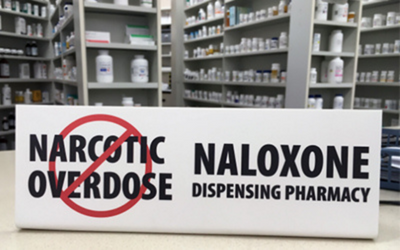
by R-IV PHTC | Jan 10, 2020 | Training
An Introduction to Harm Reduction
Year: 2019 | Competency/Strategic Skill: Problem Solving | Priority Topic: Opioid Abuse | Setting: Online | Format: On-Demand | Sponsor: Emory University/Central Office
Overview:
This is a 90-minute recording of a live webinar held on November 18, 2019.
What is harm reduction? How does it improve public health? By focusing on positive change, harm reduction encompasses a range of evidence-based and cost-effective services to reduce negative consequences for people who use drugs. During this webinar you will learn about specific harm reduction interventions including Syringe Service Programs (SSP) and Naloxone distribution. Also there will be insight into a few of the barriers to successfully implement harm reductions programs as well as how these programs can make the community stronger and more capable of reducing overdose, disease burden and community isolation.

by R-IV PHTC | Jan 10, 2020 | Training
Protecting the Public from Mosquito-borne Illnesses: The Zika Challenge
Year: 2016 | Competency/Strategic Skill: Program Planning | Priority Topic: Other Infectious Diseases | Setting: Online | Format: On-Demand | Sponsor: Emory University/Central Office
Overview:
This is a 90-minute recording of a live webinar.
On March 25, 2016 Beth P. Bell, MD, MPH, Director of CDC’s National Center for Emerging and Zoonotic Infectious Diseases, discussed the latest research findings about the current Zika outbreak and provided an overview of how health officials and health care providers can protect the public’s health from Zika virus infection. Dr. Bell also described prevention messages targeting the public and special groups such as pregnant women and travelers, and she identified credible resources that health officials and health care providers can use to train staff and educate the community about Zika and other mosquito-borne illnesses.

by R-IV PHTC | Jan 10, 2020 | Training
Opioid Epidemic and Policy: Where have we been and where are we now?
Year: 2019 | Competency/Strategic Skill: Program Planning | Priority Topic: N/A | Setting: Opioid Abuse | Format: On-Demand | Sponsor: Emory University/Central Office
Overview:
This is a 90-minute recording of a live webinar.
The current opioid epidemic exists in the context of unique drivers and circumstances including pharmaceutical marketing, business decisions of illicit drug distributors, stigma, inadequate medical and behavioral health systems, social determinants of health, among other factors. Response to this public health crisis has mobilized release of new guidance materials, legislation, funding, and policy change to address prevention, treatment, and recovery. Response to opioid use as a public health concern, however, is not new. This presentation will provide a brief overview of the history of opioid crisis and response, and the policy and programmatic response to the current crisis, including how the Substance Use-Disorder Prevention that Promotes Opioid Recovery and Treatment for Patients and Communities Act (SUPPORT for Patients and Communities Act) is guiding current federal response. A systems mapping framework will be used to describe how specific policy actions fit into the overall response effort, and the populations affected.
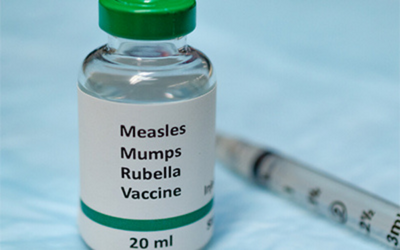
by R-IV PHTC | Jan 10, 2020 | Training
Vaccine Preventable Disease Outbreaks and Challenges in Vaccination
Year: 2019 | Competency/Strategic Skill: Program Planning | Priority Topic: Other Infectious Diseases | Setting: Online | Format: On-Demand | Sponsor: Emory University/Central Office
Overview:
This is a 90-minute recording of a live webinar.
This webinar will describe recent outbreaks of vaccine-preventable diseases, explore trends in national vaccination rates, and discuss challenges in vaccination. The webinar also describes findings from CDC audience research, tips for communicating with parents, and CDC resources for healthcare professional education and parent education.

by R-IV PHTC | Jan 10, 2020 | Training
Childhood Obesity: Simulating the Impacts of Policy Interventions
Year: 2019 | Competency/Strategic Skill: Program Planning | Priority Topic: Childhood Obesity | Setting: Online | Format: On-Demand | Sponsor: Emory University/Central Office
Overview:
This is a 90-minute recording of a live webinar.
Systems thinking, especially with simulation models, facilitates understanding of complex health policy problems. Using a simulation model to educate legislators, public health experts, and education leaders about the policies that have the greatest short- and long-term impact on childhood obesity can encourage strategic investment in low-cost, high-return policies. This webinar will feature the Georgia childhood obesity model created by and for legislators and other stakeholders to support dialogue on policy interventions designed to reduce childhood obesity (specifically, BMI for age percentiles). Participants will have the opportunity to explore the model and understand how policies and evidence-based interventions can impact obesity prevalence and costs over time.

by R-IV PHTC | Jan 10, 2020 | Training
Mental Health Response to Disasters: Human-Created Disasters (Part Two)
Year: 2019 | Competency/Strategic Skill: Program Planning | Priority Topic: Mental Health | Setting: Online | Format: On-Demand | Sponsor: Emory University/Central Office
Overview:
This is a 90-minute recording of a webinar.
This second webinar will discuss a mental health response to human-created disasters. The phases of response to a human-created disaster will be described as well as the factors that lead to resilience. Case studies on recent human-created disasters will be discussed. It will also discuss the relationship between the mental health and public health sectors and how these two groups work together during a human-created disaster.

by R-IV PHTC | Jan 10, 2020 | Training
Mental Health Response to Disasters: Natural Disasters (Part One)
Year: 2019 | Competency/Strategic Skill: Program Planning | Priority Topic: Mental Health | Setting: Online | Format: On-Demand | Sponsor: Emory University/Central Office
Overview:
This is a 90-minute recording of a webinar.
This webinar is part one of a two-part series. The first webinar will discuss a mental health response to both natural and human-created disasters. The differences for each type of disaster will be discussed with a focus on natural disasters. Case studies from different natural disasters will be discussed. It will also discuss the relationship between the mental health and public health sectors and how these two groups work together during a natural disaster.

by R-IV PHTC | Jan 10, 2020 | Training
Religion as a Social Determinant of Public Health
Year: 2019 | Competency/Strategic Skill: Program Planning | Priority Topic: N/A | Setting: Online | Format: On-Demand | Sponsor: Emory University/Central Office
Overview:
This is a 90-minute recording of a webinar.
This webinar presents evidence that religion should be considered among the social determinants of health, based on epidemiological research. Plausible mechanisms at the individual level are the lower smoking rates and greater social ties of those with religious participation. At the community level, faith-based organizations engage in partnerships with public health agencies as a source of social capital to promote health and prevent disease, particularly in hard-to-reach populations.

by R-IV PHTC | Jan 10, 2020 | Training
Scaling Up PrEP Care to End the HIV Epidemic
Year: 2019 | Competency/Strategic Skill: Program Planning | Priority Topic: HIV/AIDS | Setting: Online | Format: On-Demand | Sponsor: Emory University/Central Office
Overview:
This is a 90-minute recording of a webinar.
The federal government is launching an initiative to end the HIV epidemic by 1) increasing the number of US Americans who know their current HIV status, 2) increasing the number of US Americans with HIV infection who are effectively treated and have sustained viral suppression, and 3) rapid expansion and reduced racial/ethnic disparities in PrEP provision to the estimated 1.2 million US American with sexual and injection behaviors that place them as substantial risk of HIV acquisition. This webinar will discuss what PrEP is, indicators for its use and how health departments can support its expansion and effective use.

by R-IV PHTC | Jan 10, 2020 | Featured Training, Training
Modern Mentorship: Growing Public Health Leaders
Year: 2019 | Competency/Strategic Skill: Leadership and Systems Thinking | Priority Topic: N/A | Setting: Online | Format: On-Demand | Sponsor: Emory University/Central Office
Overview:
This is a 90-minute recording of a webinar.
Now more than ever public health is doing more with less. How can we grow, retain and better engage our best resource: our people?
This webinar will expose the participant to mentorship as a way for Public Health to increase retention and engagement. Participants will be able to identify the value of mentorship, identify 4 models of mentorship, understand the benefits of having a mentorship program and identify some strategies for creating a successful program.

by R-IV PHTC | Jan 10, 2020 | Training
Empowering Your Audience to Improve Their Health: Tools for Elevating Chronic Disease Communications to Support Your Programs
Year: 2018 | Competency/Strategic Skill: Communication | Priority Topic: N/A | Setting: Online | Format: On-Demand | Sponsor: Emory University/Central Office
Overview:
This is a 90-minute recording of a webinar.
This webinar will present the National Association of Chronic Disease Directors’ approach to effective communications about chronic diseases and chronic disease programming. It will include a brief overview of how some patient populations receive their healthcare information and common problems and solutions to reaching these populations effectively with empowering health information. General guidance for how to evaluate your own communications tools and procedures also will be included.

by R-IV PHTC | Jan 10, 2020 | Training
Public Health Law 101 and Introduction to Legal Epidemiology
Year: 2018 | Competency/Strategic Skill: Policy Development | Priority Topic: N/A | Setting: Online | Format: On-Demand | Sponsor: Emory University/Central Office
Overview:
This is a 2.5-hour recording of a live workshop.
Public health law has important implications for protecting the public’s health. However, the need to protect the public’s health must be balanced with the rights of affected individuals. Accordingly, it is more important than ever for public health officials to understand the power and limits of their authority. Having an understanding of the constitutional power and limits of this authority equips public health practitioners and partners with the tools necessary to ensure their policies are constitutionally permissible and capable of withstanding legal challenge. Understanding the powers and limits of their authority is also central to intergovernmental collaboration. The legal concept of preemption, for example, has important implications for health care delivery and public health, but can be difficult to understand and challenging to navigate in practice. Legal research has also provided vital information on the rapidly changing legal landscape that can be correlated with data on health outcomes, system performance, and costs. State, tribal, local, and territorial health departments have expressed the need for capacity-building in surveilling and monitoring their own laws and policies. With the growing recognition that legal data can be used to guide public health practice comes the need for accurate translation, or dissemination, of legal epidemiology as a tool. This mini-course was developed to address these challenges.

by R-IV PHTC | Jan 10, 2020 | Training
The Interface of Public Health and Health Care: Population Health through Improved Infectious Disease Prevention and Management
Year: 2017 | Competency/Strategic Skill: Community and Partner Engagement | Priority Topic: Other Infectious Diseases | Setting: Online | Format: On-Demand | Sponsor: Emory University/Central Office
Overview:
This is a 90-minute recording of a webinar.
This webinar will introduce the audience to the national dialogue about public health and healthcare system integration. For the last several years, there has been an ongoing national dialogue about the need for improved coordination and integration between public health and the healthcare delivery system. With improved collaboration between these two entities, expectations are that population health objectives can be more effectively met, quality of care and services can be refined, and costs could decrease. In recent years, infectious diseases have been at the forefront of the public health portfolio and have helped demonstrate the significant need to strengthen the collaboration between public health and healthcare.

by R-IV PHTC | Jan 10, 2020 | Training
Outbreaks: Protecting Americans from Infectious Diseases
Year: 2016 | Competency/Strategic Skill: Data Analytics and Assessment | Priority Topic: Other Infectious Diseases | Setting: Online | Format: On-Demand | Sponsor: Emory University/Central Office
Overview:
This is a 90-minute recording of a live lecture.
Richard Hamburg, Interim President and CEO of Trust for America’s Health (TFAH) will present “Outbreaks: Protecting Americans from Infectious Diseases lecture, which is focused on the TFAH’s December 2015 Report of the same name. The report provides state-by-state infectious disease prevention and control indicators as well as national issues and recommendations for improving our nation’s efforts to fight infectious disease. The lecture will share examples of key emerging disease, infections and emergency threats; highlight key report findings; and provide recommendations for strengthening disease prevention and control efforts.

by R-IV PHTC | Jan 10, 2020 | Training
The Business of Public Health
Year: 2013 | Competency/Strategic Skill: Resource Management and Financial Planning | Priority Topic: N/A | Setting: Online | Format: On-Demand | Sponsor: Emory University/Central Office
Overview:
This is a 80-minute recording of a live lecture.
Looking at public health from a business perspective is vital, particularly in this uncertain economic time. Join us for an enlightening discussion on public health business planning with Dr. Stephen Orton, co-author of Public Health Business Planning: A Practical Guide and Deputy Director, Executive Education, with the North Carolina Institute for Public Health at the Gillings School of Global Public Health, UNC-Chapel Hill. Dr. Orton will provide an overview of public health business planning, including the value of applying business principles to public health, key elements of a strong business plan and case studies where public health agencies/departments have developed successful business plans.

by R-IV PHTC | Jan 10, 2020 | Training
Year: 2011 | Competency/Strategic Skill: Program Planning | Priority Topic: N/A | Setting: Online | Format: On-Demand | Sponsor: Emory University/Central Office
Overview:
This is a 90-minute recording of a live lecture.
The Georgia Meth Project is a large-scale prevention program aimed at reducing Meth use through public service messaging, public policy, and community outreach. Central to the program is a research-based marketing campaign that graphically communicates the risks of Meth use. The Meth Project has been repeatedly cited as a powerful private-sector response to a devastating social problem and was recognized by the White House as one of the nation’s most effective prevention programs. The Georgia Meth Project activities increase awareness of the critical nature of the Meth problem, influencing and escalating public dialogue to find solutions. Coordinating closely with local, state, and federal agencies, the Georgia Meth Project organizes a broad range of community outreach programs that mobilize communities across Georgia to assist in Meth awareness and prevention activities.
This lecture will focus on the current state of methamphetamine use in Georgia, the Meth Project model, strategies and partners, and insights that might be incorporated into contemporary public health practice, training and education.

by R-IV PHTC | Jan 10, 2020 | Training
Health Literacy: Can We Confuse People Less?
Year: 2012 | Competency/Strategic Skill: Communication | Priority Topic: N/A | Setting: Online | Format: On-Demand | Sponsor: Emory University/Central Office
Overview:
This is a 90-minute recording of a live lecture.
What is this lecture about? Health Literacy is essential for successful access to care and use of services, self-care of chronic conditions, and maintenance of health and wellness. Health literacy is fundamental to healthcare that requires individuals to have a more active role in decisions and management. The IOM reports that 90 million people, nearly half our adult population, lack health literacy skills needed to understand and act on health information and health system demands. Only 12% of U.S. adults have the health literacy proficiency to perform complex health tasks such as using a table to calculate an employee’s share of health insurance costs. Join us for updates on the latest research findings, policy implications, and hands-on tools for addressing the problem.

by R-IV PHTC | Jan 10, 2020 | Training
Controlling Asthma in Georgia: Accomplishments and Future Directions
Year: 2014 | Competency/Strategic Skill: Program Planning | Priority Topic: N/A | Setting: Online | Format: On-Demand | Sponsor: Emory University/Central Office
Overview:
This is a 80-minute recording of a live lecture.
This is the fifth presentation in our 5-part series on Georgia’s health priorities. This presentation will focus on asthma in Georgia.
Dr. Elizabeth Herman, senior scientist with the Air Pollution and Respiratory Health Branch, National Center for Environmental Health at Centers for Disease Control and Prevention, will share the national perspective on the burden of asthma and efforts to reduce that burden as well as opportunities for state programs to expand access to comprehensive asthma control services through health care reform. Dr. Jean O’Connor, Director, Health Promotion and Disease Prevention Section with the Georgia Department of Health, will focus on the burden of asthma in Georgia and what the Georgia Asthma Control program has done to date to address that burden.
The Georgia Asthma Control program (GACP) is part of a national initiative launched by the Centers for Disease Control and Prevention, National Center for Environmental Health (Air Pollution and Respiratory Health Branch). GACP aims to reduce the burden of asthma and improve the health and quality of life among Georgians affected by asthma through effective control of the disease.

by R-IV PHTC | Jan 10, 2020 | Training
State of the State Address on Georgia’s Health Priorities
Year: 2013 | Competency/Strategic Skill: Program Planning | Priority Topic: N/A | Setting: Online | Format: On-Demand | Sponsor: Emory University/Central Office
Overview:
These are recordings of a series of live lectures.
Dr. Brenda Fitzgerald, Commissioner of the Georgia Department of Public Health will provider a State of the State Address on the Georgia’s Health Priorities. The lecture provides an overview of the Georgia DPH health priorities for the state of Georgia including specific health problems and target outcomes. Dr. Fitzgerald will also discuss strategies in place to address these health problem and the work still needing to be done to improve the health and vitality of Georgia’s residents.

by R-IV PHTC | Jan 10, 2020 | Training
Implementation Science: Approaches to Integrating Research into Practice and Policy
Year: 2011 | Competency/Strategic Skill: Program Planning | Priority Topic: N/A | Setting: Online | Format: On-Demand | Sponsor: Emory University/Central Office
Overview:
This is a 90-minute recording of a live lecture.
Each year, billions of U.S. tax dollars are spent on research and hundreds of billions are spent on service delivery programs. However, relatively little is spent on, or known about, how best to ensure that the lessons learned from research inform and improve the quality of health and human services and the availability and utilization of evidence-based approaches. In the context of increased interest and investment in comparative effectiveness research that will help to determine the optimal and/or most cost-effective interventions to be used in clinical and community healthcare practice, it is essential that both clinical and public health practitioners are equipped with empirically-supported strategies to integrate scientific knowledge and effective interventions into everyday use. The National Institutes of Health have recognized that closing the gap between research discovery and program delivery is both a complex challenge and an absolute necessity if we are to ensure that all populations benefit from the Nation’s investments in new scientific discoveries. This lecture will focus on approaches to moving research into public health practice and policy. With an understanding of the importance of implementation science, challenges for improving efficient and meaningful translation will be discussed and dissemination and implementation frameworks will be highlighted along with examples and useful tools for both researchers and public health practitioners.

by R-IV PHTC | Jan 10, 2020 | Training
Georgia Legislative Update and the Impact on Public Health
Year: 2018 | Competency/Strategic Skill: Policy Development | Priority Topic: N/A | Setting: Online | Format: On-Demand | Sponsor: Emory University/Central Office
Overview:
These are recordings of live lectures held on May 5, 2015; May 6, 2016; May 19, 2017; and May 16, 2018.
Scott Maxwell, Founding Partner of Mathews and Maxwell, Inc. and Legislative Liaison for the Georgia Public Health Association will provide an update on the previous Georgia Legislative Session, including highlights of legislation and appropriations that will have an impact on public health. The presentation will also include a forecast for public health-related legislation. Scott will leave participants with some strategies for promoting public health in their local communities and across the state.

by R-IV PHTC | Jan 10, 2020 | Training
Crisis and Emergency Risk Communication (CERC): Examples from Ebola
Year: 2014 | Competency/Strategic Skill: Communication | Priority Topic: Other Infectious Diseases | Setting: Online | Format: On-Demand | Sponsor: Emory University/Central Office
Overview:
This is a 105-minute recording of a webinar.
Health communication is a critical piece of keeping the public safe during a public health emergency. During this two hour interactive session, the audience will learn the principles behind crisis and emergency risk communication. Because each emergency is different, we will discuss ways to tailor messages for the crisis and emergency risk communication. During times of crisis, developing partnerships with stakeholders to disseminate messages is very important. Participants will learn about ways to develop these relationships for successful health communication.

by R-IV PHTC | Jan 10, 2020 | Training
A Community Initiative to Fight the Heroin and Opiate Epidemic
Year: 2017 | Competency/Strategic Skill: Community and Partner Engagement | Priority Topic: Opioid Abuse | Setting: Online | Format: On-Demand | Sponsor: University of Alabama at Birmingham
Overview:
This is a 60-minute recording of a live webcast.
Joyce White Vance was one of the first five U.S. attorneys nominated by President Barack Obama. When few recognized the emerging epidemic of heroin- and opioid-related deaths, Vance, in her role as U.S. attorney, convened the first “Pills to Needles Summit” in June 2014 that overnight galvanized community leaders around this new public health threat. Through her leadership and determination, she established a new paradigm to address this threat to the public’s health that linked law enforcement, government, academia, public health, victims and advocates. Together these institutions, organizations and individuals have worked a long-term strategy that recognizes the complexities of this epidemic, and is sufficiently flexible to adjust to anticipated but unknown changes in the substances, the populations and the distributors.

by R-IV PHTC | Jan 10, 2020 | Training
Population-level Risks for Preterm Birth in the U.S. and Alabama
Year: 2017 | Competency/Strategic Skill: Leadership and Systems Thinking | Priority Topic: N/A | Setting: Online | Format: On-Demand | Sponsor: University of Alabama at Birmingham
Overview:
This is a 1-hour recording of a live webcast.
It is well known that preterm birth rates are higher in the U.S. than in other developed countries, and preterm birth rates are higher in Alabama than in many other states in the U.S. While our natural inclination is to look for weaknesses in the health care system or health care system access that might explain these rates, the preterm birth rate is actually not that responsive to changes in health care. This presentation explores an alternative explanation: that more child-bearing age women in the U.S. are exposed to some of the major population-level risks for preterm birth, compared to women in other countries. We compare exposures at the pregnancy, individual, community and policy levels and identify the key ways that the U.S. differs from other countries. We then consider which of these factors also differentiate Alabama from other states.

by R-IV PHTC | Jan 10, 2020 | Training
Alzheimer’s from A to Z: Memory Loss, Dementia and the Basics of Alzheimer’s Disease
Year: 2017 | Competency/Strategic Skill: N/A | Priority Topic: N/A | Setting: Online | Format: On-Demand | Sponsor: University of Alabama at Birmingham
Overview:
This is a 1-hour recording of a live webinar.
Alzheimer’s disease is not a normal part of aging. It is the most common form of dementia and accounts for 60-80% of all cases of dementia in American’s aged 71 and older. This program provides more information on the basics of Alzheimer’s including information on detection, causes and risk factors, stages of the disease, treatment and more. In this training, we will discuss various aspects of Alzheimer’s disease including the anatomy of Alzheimer’s disease (normal aging versus Alzheimer’s), how individuals experience dementia (i.e. progression), reversible versus non-reversible dementias and related dementias, risk factors of Alzheimer’s disease, screening, diagnosis and treatment, medications to treat symptoms, clinical research studies, and other related topics.

by R-IV PHTC | Jan 10, 2020 | Training
The Cost of Health Literacy
Year: 2017 | Competency/Strategic Skill: Communication | Priority Topic: N/A | Setting: Online | Format: On-Demand | Sponsor: University of Alabama at Birmingham
Overview:
This is a 1-hour recording of a live online training.
Although health literacy has gained much-needed attention over the past decade, an alarming number of American adults continue to report a poor understanding of healthcare information. It is important that everyone working in health care, from front-desk staff to primary care providers, have a thorough understanding of the complexity of health literacy and the impact limited health literacy has on patient outcomes and health care costs. This program provides an introduction to health literacy and how it contributes to increased health care cost. The program will also discuss ways to identify patients at risk for low health literacy as well as practical tools health professionals can use to improve provider-patient communication.

by R-IV PHTC | Jan 10, 2020 | Training
Opioid Prescription Control: When the Corrective Goes Too Far
Year: 2018 | Competency/Strategic Skill: Program Planning | Priority Topic: Opioid Abuse | Setting: Online | Format: On-Demand | Sponsor: University of Alabama at Birmingham
Overview:
This is a 1-hour recording of a live webinar.
The purpose of this program is to delve deeper into the complexity of the evolving opioid epidemic. This program will discuss how the opioid epidemic has evolved including current trends in opioid prescribing and use, early causes of the opioid epidemic, and factors that sustain the epidemic today. In addition, federal response policies will be discussed including the intended and unintended impacts for prescribers and patients. CDC Guidelines that encourage a careful weighing of risks and benefits for each patient will also be reviewed. Finally, the importance of patient and provider education and legislation in preventing prescription overdose death will be introduced.

by R-IV PHTC | Jan 10, 2020 | Training
Human Trafficking Awareness for Public Health Providers
Year: 2016 | Competency/Strategic Skill: N/A | Priority Topic: N/A | Setting: Online | Format: On-Demand | Sponsor: University of Alabama at Birmingham
Overview:
This is a 2-hour recording of a live webcast.
Human trafficking is the illegal trade of human beings, through abduction, the use of threat of force, deception, fraud, or sale for the purposes of sexual exploitation or forced labor. Every year, thousands of men, women and children fall into the hands of traffickers, in their own countries and abroad. Almost every country in the world is affected by trafficking, whether as a country of origin, transit or destination for victims. This program will provide a firsthand account from a sex-trafficking victim of her experiences, along with how she survived and reclaimed her life. Program faculty will discuss what the human trafficking”red flags” are to look for, what questions to ask, how to ask those questions and what verbal and non-verbal clues they should look for.

by R-IV PHTC | Jan 10, 2020 | Training
The Search for a National Child Health Policy: Progress, Opportunities & Challenges
Year: 2016 | Competency/Strategic Skill: Policy Development | Priority Topic: Childhood Obesity | Setting: Online | Format: On-Demand | Sponsor: University of Alabama at Birmingham
Overview:
This is a 1-hour recording of a live lecture.
This is the Ann Dial McMillan Endowed Lectureship In Family & Child Health featuring Sara Rosenbaum, JD, Professor of Health Law & Policy and Founding Chair, Dept. of Health Policy, Milken Institute School of Public Health, George Washington University.

by R-IV PHTC | Jan 10, 2020 | Training
The Diabetes Epidemic in Alabama: An Overview
Year: 2016 | Competency/Strategic Skill: N/A | Priority Topic: N/A | Setting: Online | Format: On-Demand | Sponsor: University of Alabama at Birmingham
Overview:
This is a 90-minute recording of a live webcast.
In the past several decades diagnosed cases of diabetes have increased at alarming rates, costing billions of dollars in medical expenditures and lost work and wages for people known to have the disease. In 2015, the CDC estimated that 29.1 million children and adults in the U.S. (9.3% of the population) had a confirmed diagnosis of diabetes and as many as 86 million (25% of the U.S. population) may have a condition known as pre-diabetes. Alabama currently ranks 50th, with the highest prevalence of diabetes in the U.S. In the past two years, the prevalence of diabetes has increased from 11.8 percent to 13.8 percent in the adult population in Alabama, with many more undiagnosed. Program faculty will provide an overview of diabetes including diagnosis, management and complications.

by R-IV PHTC | Jan 10, 2020 | Training
Human Trafficking in Alabama: Resources for Healthcare Workers to Identify and Combat Human Trafficking
Year: 2016 | Competency/Strategic Skill: Program Planning | Priority Topic: N/A | Setting: Online | Format: On-Demand | Sponsor: University of Alabama at Birmingham
Overview:
This is a 90-minute recording of a live broadcast.
Human trafficking is one of the largest criminal industries in the world, second only to drug trafficking. Worldwide, it is a $32 billion industry involving the illegal movement of men, women, and children, for the purpose of forced labor or commercial sexual exploitation. In the United States, human trafficking has been reported in all 50 states and 40% of human trafficking takes place in the Southeast. Interstate I-20 is considered a”superhighway” for human trafficking; Birmingham is considered one of the hot spots. This program will give a brief introduction to the connection between trauma and health, provide a brief definition of human trafficking, examine research, theories, and concepts associated with human trafficking, and discuss the importance of trauma informed care in helping victims of human trafficking. This program will conclude with a look at how the WellHouse is integrating trauma informed care into their program and services.

by R-IV PHTC | Jan 9, 2020 | Training
Disaster Preparedness: Are We Ready for Kids
Year: 2013 | Competency/Strategic Skill: Program Planning | Priority Topic: N/A | Setting: Online | Format: On-Demand | Sponsor: University of Alabama at Birmingham
Overview:
This is a 90-minute course.
Children represent an at-risk segment of the population in the face of natural and man-made disasters. Effective pediatric planning at the state and local level requires an awareness of hazard vulnerabilities and the advance consideration of the unique needs of children and families. Improved readiness can be achieved through collaboration between public health and emergency management leadership and key pediatric care experts and stakeholders in the private sector. This course will examine how effective communication among all parties, including the public, will serve to improve preparedness in advance of a disaster.

by R-IV PHTC | Jan 9, 2020 | Training
Vaccines: They’ve Got To Be Used To Work-Lessons from the 2015 Measles Outbreak
Year: 2015 | Competency/Strategic Skill: Program Planning | Priority Topic: Other Infectious Diseases | Setting: Online | Format: On-Demand | Sponsor: University of Alabama at Birmingham
Overview:
This is a 90-minute recording of a live satellite broadcast presentation.
Program faculty discussed how the measles outbreak may have improved the public’s perception of the benefits of vaccination programs, leading to improved vaccination rates in at-risk communities.

by R-IV PHTC | Jan 7, 2020 | Training
Year: Unknown | Competency/Strategic Skill: Communication | Priority Topic: N/A | Setting: Online | Format: On-Demand | Sponsor: University of Louisville
Overview:
This video includes an overview of health literacy (definition, types, statistics), a discussion of health literacy as a public health issue and issue among African Americans, and strategies to address health literacy among African Americans.
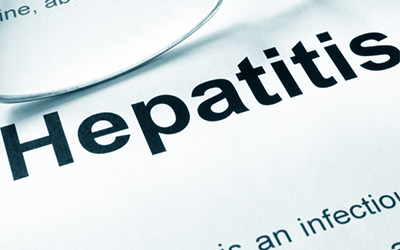
by R-IV PHTC | Jan 7, 2020 | Training
HIV & Hepatitis C – A Public Health Emergency of Nationwide Concern: Kentucky & Indiana’s Local Response
Year: 2017 | Competency/Strategic Skill: Data Analytics and Assessment | Priority Topic: HIV/AIDS | Setting: Online | Format: On-Demand | Sponsor: University of Louisville
Overview:
This is a 1-hour recording of a live webinar.
This webinar will characterize the HIV and Hepatitis C outbreak in Scott County in IN and regions within KY. The goal of the lecture is to review the epidemiology associated with the outbreaks in the two states and discuss the current control programs in Indiana and Kentucky.

by R-IV PHTC | Jan 7, 2020 | Training
Year: 2015 | Competency/Strategic Skill: Data Analytics and Assessment | Priority Topic: N/A | Setting: Online | Format: On-Demand | Sponsor: University of Louisville
Overview:
This is a 30-minute online course.
Probability Overview offers a review of statistical procedures for calculating probability and making inferences from data. Students will be able to apply various methods to calculate probability of an event using tables or probability equations.

by R-IV PHTC | Jan 7, 2020 | Training
Principles of Confidence Intervals
Year: 2015 | Competency/Strategic Skill: Data Analytics and Assessment | Priority Topic: N/A | Setting: Online | Format: On-Demand | Sponsor: University of Louisville
Overview:
This is a 30-minute online course.
This is the first course in a two-part series including Confidence Intervals of Relative Risks and Odds Ratios. Principles of Confidence Intervals gives an overview of the Normal Distribution, how to find a confidence interval, and how to interpret confidence intervals in scientific literature. General statistical procedures and values are reviewed as they pertain to confidence intervals.

by R-IV PHTC | Jan 7, 2020 | Training
Outbreak Update 2014-2015
Year: 2015 | Competency/Strategic Skill: Program Planning | Priority Topic: Other Infectious Diseases | Setting: Online | Format: On-Demand | Sponsor: University of Louisville
Overview:
This is a 1-hour course.
This self-directed course offers an overview of prevalent international infectious disease outbreaks from 2014 to 2015. Participants will learn to identify health issues related to these outbreaks and receive information regarding treatment, protocol and prevention.

by R-IV PHTC | Jan 7, 2020 | Training
Various Rates Used in Clinical Research
Year: 2015 | Competency/Strategic Skill: Data Analytics and Assessment | Priority Topic: N/A | Setting: Online | Format: On-Demand | Sponsor: University of Louisville
Overview:
This is a 15-minute online course.
This is the second course in a two part series including Relative Risks and Odds Ratios. Various Rates Used in Clinical Research gives an overview of rates used to describe clinical research observations. While odds ratios and relative risks are used extensively, this presentation covers experimental event rates, control event rates, absolute risk reduction, relative risk reduction, and number needed to treat.

by R-IV PHTC | Jan 7, 2020 | Training
Validity in Health Sciences
Year: 2015 | Competency/Strategic Skill: Data Analytics and Assessment | Priority Topic: N/A | Setting: Online | Format: On-Demand | Sponsor: University of Louisville
Overview:
This is a 30-minute online course.
Validity in Health Sciences reviews definitions of validity and the various ways the validity of an instrument can be evaluated. The course covers content, criterion-related, and construct validity as well as specificity, sensitivity and positive predictive value. The presentation applies these concepts by providing examples of these measures found in relevant literature.

by R-IV PHTC | Jan 7, 2020 | Training
Relative Risks and Odds Ratios
Year: 2015 | Competency/Strategic Skill: Data Analytics and Assessment | Priority Topic: N/A | Setting: Online | Format: On-Demand | Sponsor: University of Louisville
Overview:
This is a 30-minute online course.
Relative Risks and Odds Ratios explains the difference between the two measures while giving instruction for evaluating them. Contingency tables, equations and computations, study design, and interpretation of values are reviewed. These methods are applied through examples in data sets to practice the material learned.

by R-IV PHTC | Jan 7, 2020 | Training
Introduction to Data Collection and Reliability
Year: 2015 | Competency/Strategic Skill: Data Analytics and Assessment | Priority Topic: N/A | Setting: Online | Format: On-Demand | Sponsor: University of Louisville
Overview:
This is a 1-hour online course.
Introduction to Data Collection and Reliability provides background for the methodology of quality data collection, and an introduction to statistical methods for measuring reliability of an instrument. Students will evaluate and select appropriate data collection instruments, distinguish between reliability and validity, and employ methods for determining reliability of an instrument.

by R-IV PHTC | Jan 6, 2020 | Training
Influences on Correlation Coefficients
Year: 2015 | Competency/Strategic Skill: Data Analytics and Assessment | Priority Topic: N/A | Setting: Online | Format: On-Demand | Sponsor: University of Louisville
Overview:
This is a 30-minute online course.
Influences on Correlation Coefficients is the second course in a two-part series. The preceding course is Bivariate Linear Correlation. Influences on Correlation Coefficients describes how the value of r and other coefficients can be biased by items including outliers, restriction of range, and errors of measurement. A summary is provided for calculating correlation coefficients based on the nature of variables being evaluated. The course distinguishes correlation from causation, and explains how to best evaluate the correlation coefficient.

by R-IV PHTC | Jan 6, 2020 | Training
Data Collection Assessment Examples and Resources
Year: 2015 | Competency/Strategic Skill: Data Analytics and Assessment | Priority Topic: N/A | Setting: Online | Format: On-Demand | Sponsor: University of Louisville
Overview:
This is a 30-minute online course.
This is the second course in a two part series, following Validity in Health Sciences.
Data Collection Assessment Examples and Resources applies knowledge of correlation, reliability, and validity of measurements to examples in relevant health science literature. The course provides resources to investigate the topic further, and see more examples of data collection assessment.




















